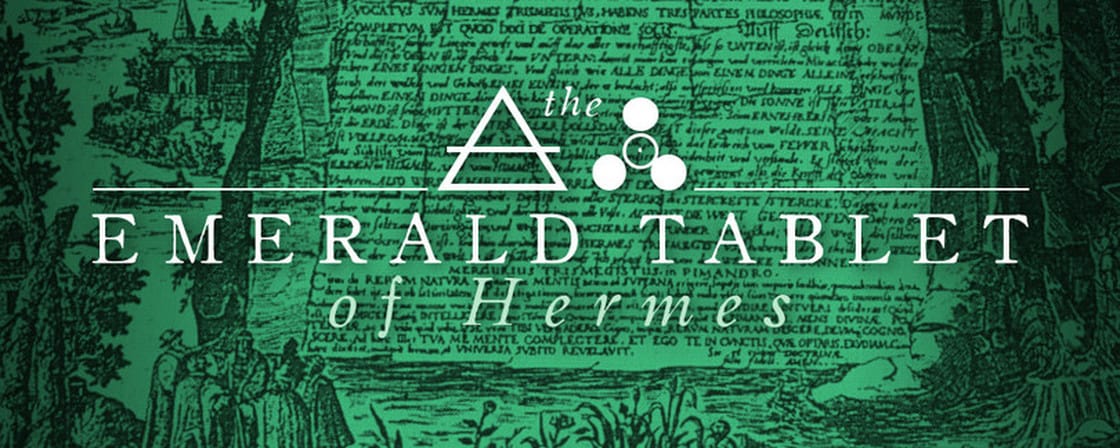Balinas
Kitāb sirr al-ḫalīqa
8th century CE
trans. Henry Carrington Bolton
1904
|
NOTE |
From my commentary in Foundations of Atlantis: Alleged to have been composed by Hermes Trismegistus (“Thrice-Great”), who is often identified as an ancient astronaut or an Atlantean, the text in question allegedly was discovered by Alexander the Great in a cave near Hebron. In reality, it is believed to be a medieval Arab work summarizing Hermetic principles later applied to alchemy. The text was first published in Arabic, though it claimed to be a translation from the Syriac of an older Greek text. Most scholars believe this to be fictional and Arabic the first language. In the West, the text was known from two Latin translations, those of John of Seville around 1120 and Philippus Tripolitanus from 1232. More translations were made from these in various European languages, with still further translations made in turn from these, becoming one of the most popular alchemical texts throughout the medieval and early modern periods. It remains the only non-Greek Hermetic text routinely included in Western Hermetic collections. The modern Emerald Tablets of Thoth are an apocryphal work written by Maurice Doreal that borrows the name of this text for a modern “channeled” text created in the 1940s from fairly direct copying from weird fiction writers like H. P. Lovecraft (“The Dunwich Horror”) and Frank Belknap Long (“The Hounds of Tindalos”). Many fringe writers accept it as Atlantean.
|
1 I speak not of fictitious things but of that which is most certain and true.
2 Whatsoever is below is like that which is above, and that which is above is similar to that which is below to accomplish the miracles of one thing.
3 And as all things were produced by the meditation of one Being, so all things were produced from this one thing by adaptation.
4 Its father is Sol, its mother Luna; the wind carried it in its belly, the earth is its nurse.
5 It is the cause of all perfection throughout the whole earth.
6 Its power is perfect, if it be changed into earth.
7 Separate the earth from the fire the subtile from the gross, acting prudently and with judgment.
8 Ascend with the greatest sagacity from the earth to heaven, and then again descend to the earth, and unite together the powers of things superior and things inferior.
9 Thus you will possess the glory of the whole world, and all obscurity will fly far away from you.
10 This thing has more fortitude than fortitude itself, because it will overcome every subtile thing and penetrate every solid thing.
11 By it this world was formed.
12 Hence proceed wonderful things which in this wise were established.
13 For this reason I am called Hermes Trismegistus, because I possess three parts of the philosophy of the whole world.
14 What I had to say about the operation of Sol is completed.
2 Whatsoever is below is like that which is above, and that which is above is similar to that which is below to accomplish the miracles of one thing.
3 And as all things were produced by the meditation of one Being, so all things were produced from this one thing by adaptation.
4 Its father is Sol, its mother Luna; the wind carried it in its belly, the earth is its nurse.
5 It is the cause of all perfection throughout the whole earth.
6 Its power is perfect, if it be changed into earth.
7 Separate the earth from the fire the subtile from the gross, acting prudently and with judgment.
8 Ascend with the greatest sagacity from the earth to heaven, and then again descend to the earth, and unite together the powers of things superior and things inferior.
9 Thus you will possess the glory of the whole world, and all obscurity will fly far away from you.
10 This thing has more fortitude than fortitude itself, because it will overcome every subtile thing and penetrate every solid thing.
11 By it this world was formed.
12 Hence proceed wonderful things which in this wise were established.
13 For this reason I am called Hermes Trismegistus, because I possess three parts of the philosophy of the whole world.
14 What I had to say about the operation of Sol is completed.
|
Source: Henry Carrington Bolton, The Follies of Science at the Court of Rudolph II: 1576-1612 (Milwaukee: Pharmaceutical Review Publishing Co., 1904), 35. Bolton’s translation is an uncredited adaptation of Thomas Thomson’s translation in the History of Chemistry (1830).
|



